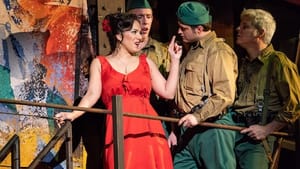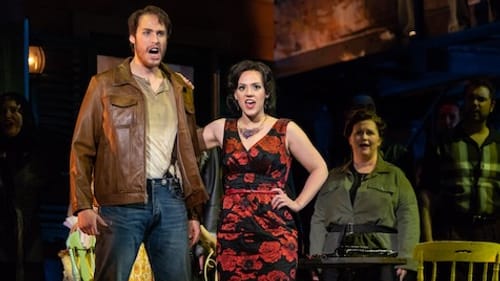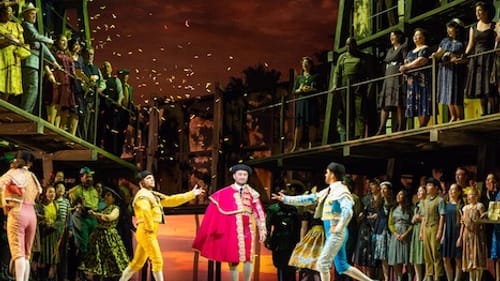Stay in the Loop
BSR publishes on a weekly schedule, with an email newsletter every Wednesday and Thursday morning. There’s no paywall, and subscribing is always free.
Roma Holiday
Opera Philadelphia presents Georges Bizet's 'Carmen'

Opera Philadelphia’s 2017-2018 season has mostly focused on new and contemporary work. That adventurous spirit rubs off on its presentation of Bizet’s Carmen, in a thrilling new production at the Academy of Music by Scottish director Paul Curran.
Few operas have entered the public consciousness as widely as Carmen, with its hummable tunes and irresistible heroine. Familiarity can breed complacency, though, and it’s easy to forget what a rich, dark story lurks beneath those colorful costumes and clicking castanets.
Balancing act
Curran respects the history of the piece while smartly updating it. He sets the action in an unspecified country, sometime in the mid-20th century. The constant presence of uniformed soldiers and Act I’s looming wrought-iron factory gates suggest a repressive society such as Franco’s Spain or Castro’s Cuba.
One of the opera’s most important, and often maddeningly unexplored, themes is the idea of the individual versus society. The hint of totalitarianism injected throughout adds a level of ever-present danger to Carmen’s rebellious spirit — she challenges not only established mores but the demands of a culture where stepping out of line can equal death. And by luring the infatuated Don José away from convention and down her iconoclastic path, she ensures his downfall.
Still, the production elements never dip too far into Regietheater. Gary McCann’s vibrant sets — eye-catching billboards, inviting cafés, teeming town squares — suggest seediness and enticement. The same can be said for his costumes, which balance glamour and gaudiness; we first see Carmen (Argentinian mezzo-soprano Daniela Mack) in a bright-red slip dress that looks like a poor girl’s idea of high fashion.
The cast proves equally adept at balancing this juxtaposition between alluring surfaces and the gritty underbelly they hide. Mack’s Carmen seems smarter and better defined than usual. Never reckless, she controls her destiny at all points, even when she senses the outcome will not be in her favor.

Mack proved herself a committed actor earlier this season in Opera Philadelphia’s Elizabeth Cree. The theatrical virtues she displayed there follow her to this equally demanding role.
She isn’t a born Carmen vocally. Her lower register lacks the juiciness one expects in the part, and she tends to turn inaudible during larger ensembles. But she compensates with intelligence and wit, delivering a polished performance that remains refreshingly free of stereotype.
Fatal attraction
By contrast, debuting American tenor Evan LeRoy Johnson’s Don José is an unqualified triumph. He’s tall and arrestingly handsome, with an easily produced voice and a real knack for French style.
Johnson charts José’s progression from mama’s-boy military officer to passion-crazed maniac with exacting detail. Rarely have I been so conscious of the changes in this character’s persona, even within the span of a single scene. And rarely have I heard “La fleur que tu m’avais jetée” (“The flower you threw to me”), José’s second-act cri de cœur, performed with such a balance of refinement and ardent desire.
Together, Mack and Johnson make a convincingly obsessive and self-destructive couple, right up until the moment of their fatal final showdown. Unfortunately, Curran concocts several tricks for the concluding scene that reek of gimmickry. But the commitment Mack and Johnson bring to the scene compensates for any extranarrative cheapness.
Kirsten MacKinnon brings a welcome dose of gravitas to Micaëla, the village girl Don José should marry. Her attractive soprano, large and piercing at the top, complements this steely interpretation.

South African bass-baritone Musa Ngqungwana makes a memorable Zuniga, and Opera Philadelphia emerging artist Johnathan McCullough steals scenes as Moralès. Ashley Milanese, Anastasiia Sidrova, and Doğukan Kuran — all resident artists at Curtis Institute of Music — fill out the opera’s supporting roles with aplomb.
No bull
Only debutant Adrian Timpau, as bullfighter Escamillo, disappoints. The Moldovan performer brings appropriate swagger to his performance, making his entrance on a motorbike. He also smolders his way through “Votre toast, je peux vous le rendre,” known as the “Toreador Song.” But his light baritone doesn’t have the resonance the role requires, and he proves no match for Johnson during Escamillo’s third-act confrontation with Don José.
Conductor Yves Abel makes an impressive debut in the pit, leading a performance that builds terrifically throughout, with particularly good playing from the brass and lower strings. Abel is sensitive to the needs of the singers without being overindulgent, and he highlights the various musical motifs punctuating the score. He shows no fear of rubato, drawing out phrases to accentuate their sultriness.
Abel sometimes rushed too quickly into transitional phrases at the performance I attended, which were drowned out by applause from the appreciative crowd. But I didn’t resent the audience for voicing their approval. When you encounter a Carmen this good, you have to cheer.
What, When, Where
Carmen. By Georges Bizet, Ludovic Halévy, and Henri Meilhac; Paul Curran directed. Opera Philadelphia. Through May 6, 2018, at the Academy of Music, 240 S. Broad Street, Philadelphia. (215) 732-8400 or operaphila.org.
Sign up for our newsletter
All of the week's new articles, all in one place. Sign up for the free weekly BSR newsletters, and don't miss a conversation.

 Cameron Kelsall
Cameron Kelsall